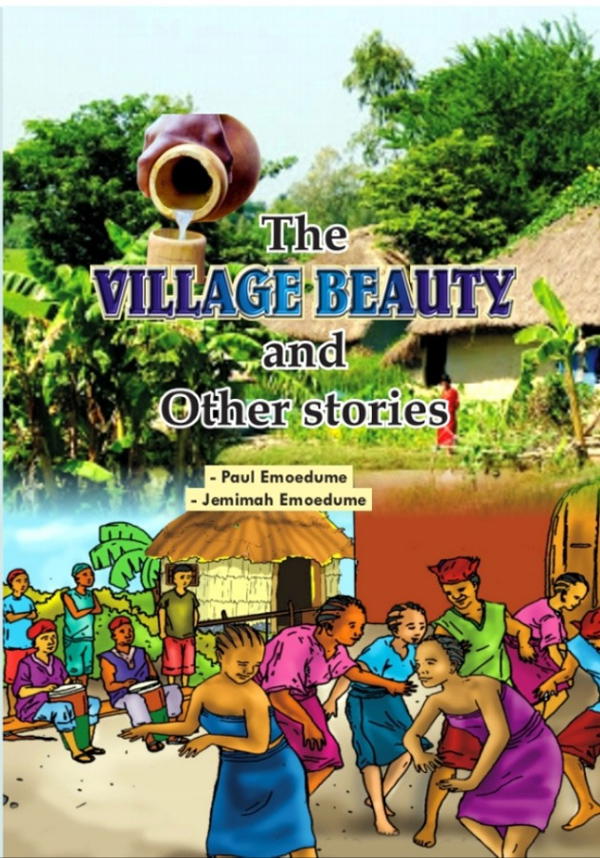
By Lucky Oji
The Village Beauty and Other Stories, a collection of short stories, is a book put together to reignite the need to go back to our our folklore tradition.
The 69-page book was meant for the reading pleasure of children, young adults and adults who had no opportunity to be raised in a village setting or a nostalgia to those missing all they experienced in the past. The stories have some moral lessons..
The nine-chapter book masterfully crafted by Jemimah Emoedume, a 10- year-old JSS student in conjunction with Mr. Paul Emoedume, begins with a story of Eniye, an epitome of beauty and grace. She brought honour to her community, Omoto by winning different beauty cum dancing competitions organised in her village and subsequently among the 19 villages that made up the Ajade Clan.
In chapter two, the story of Christmas Eve in Ujatue was related, capturing how children and youths felt in the good old days during Christmas period.There lived in that village Osi, who together with other children and youths of Edeva Quarters had maintained the tradition of keeping wake on Christmas Eves using bornfire, explosives and special delicacies to mark the night, until the shouts of ‘Happy Christmas’, to herald the dawn of Christmas day.
Chapter three narrates a story of Aleakhue family having fortune smiling on them by finding the Eghi tortoise needed for the sacrifice to save Prince Okhaimoh’s life. This comes with a handsome reward of half of Chief Azeto, the king’s wealth. All the village hunters could not get this sacrificial item but Oshioze found it in company of her siblings Otse and Omeghe.
Then, the story of Aleogho, the Bicycle Repairer comes next in chapter four. He was woken up from a dream by Aleakhue, a village merchant and shop keeper who sold to his customers on credit with crazy interest rates to be repaid on, or immediately after the market day. Aleakhue brought his bicycle for repairs at Aleogho’s shop and came to collect it to facilitate his moving round the town to collect his money from his debtors.
In chapter 5 of the book, Akhalu, a stubborn and disobedient child’s story was told with the attendant consequences of his disobedience. He disobeyed the mother’s instructions and went to play acrobatic game with his peers. He was seriously injured and was taken to a local bone setter for rehabilitation. He suffered dearly from the treatment and learnt a bitter lesson and vowed never to be recalcitrant again.
In nostalgia, chapter six relates the story of the Village stream in Afekhai in which Odela and his brothers, Aleghe and Ona were made to go and fetch water every morning before going to school. Odela detested the responsibility foisted on him by his father that he has to answer for the crimes or otherwise of his younger ones. He also could not understand the hypocritical disposition of his father, who pretends to worship God but have awesome fear and reverence for the river goddess.
Recapturing what looks like a childhood experience, the writer narrates in chapter seven what obtained in a local orthodox church where harvest thanksgiving bazaars were conducted to raise money for the church. The children always look forward to such periods as it was usually done in a carnival-like atmosphere, with a lot to eat.
In chapter eight, comes the story of a 72-year-old bean cake (Akara) seller, Oleye, who despite her disdain for her customers still had overflow or mad rush of people begging to have her sell to them. Some villagers suspect that she was using charm to hypnotize customers into buying her bean cake.
In the last chapter, the book relates a story on harmattan fire. Elamah from Abigbo village with his group usually engaged in game hunting during harmattan period. They usually set the bush on fire, tactically devised means of killing animals escaping the fire. The group sell part of their haul and use the proceeds to buy costumes or artefacts for their masquerade dance.
The book is quite an interesting piece of work, with a lot of imageries. The grammar is top notch with just a few typographical or grammatical errors which should be corrected in the next edition. For example on page 5, the sentence, “From these two would emerged the most beautiful and best dancer this year, ” should instead use the verb ’emerge”, Usually, the boys sleep o in the open field, the ‘o’ should be expunged(page 14). On page 26, the use of ‘owing gown’ instead of flowing gown. Again, on page 62, there was an omission of ‘fi’ in the statement ‘any likelihood of escape from the ‘re’ points’ which I believe should be fire instead of ‘re’.
Although the book provides a glossary to help the readers to understand the meaning of some difficult words, it is written in a language a little bit more sophisticated than the audience(children) it was mainly meant to serve.
Disclaimer
Comments expressed here do not reflect the opinions of Vanguard newspapers or any employee thereof.